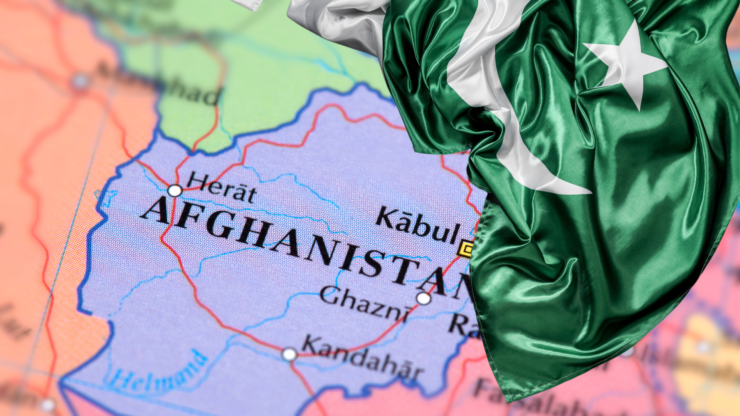
In the past few months, Pak-Afghan relations have witnessed severe strain due to rising terrorist attacks in Pakistan. TTP, BLA, and ISKP hold safe havens in Afghanistan. Both sides blamed each other for the security lapse. Pakistan even conducted aerial strikes in Afghanistan on the safe havens of TTP. The Taliban government in Afghanistan was reluctant to cooperate with Pakistan over this issue. However, both sides have recently decided on security cooperation over the issue of across-the-border terrorism.
Introduction
The Afghan Taliban took over Kabul on 15th August 2021. They’re struggling to govern the entire country and control the already present terrorist outfits on Afghan soil since then. There is a lack of evidence of the incumbent Afghan government’s reluctance to act against the terrorist groups using Afghan soil against its neighbors. The interim Afghan government has assured its neighbors multiple times to prevent terrorists from using their land to conduct terrorism in the region. However, lack of training and expertise to run a state act as the hurdle in coping with this challenge.
Pakistan has observed numerous terrorist attacks from different terrorist organizations operating from Afghanistan. The former has also blamed its regional rivals for using these terrorist groups as a proxy to impinge Pakistan’s geostrategic and economic interests through these terrorist organizations. Since the takeover of the Taliban government in Afghanistan, the country has witnessed a significant surge of almost 73 percent in terrorist activities from the TTP, ISKP, BLA, and other terrorist groups operating from Afghanistan. The number of causalities in these attacks has increased to 138 percent in the first 21 months of the interim government in Afghanistan. Chinese engineers are amongst the most targeted individuals in these attacks, further strengthening the suspicions of the involvement of regional or global rivals behind these attacks.
On March 26, 2024, the TTP conducted a terrorist attack on Chinese officials, resulting in the death of five Chinese nationals and their Pakistani driver. These deteriorated Pak-China relations significantly. Progress on three crucial hydropower projects – The Diamer-Basha Dam, Tarbela Dam extension project, and the Dasu Dam, was affected by this attack. Pakistan has raised its concerns with the Taliban government multiple times about this issue. However, the two sides have been exchanging blame without making any significant progress in countering this menace. Pakistan’s Inter-Services Public Relations (ISPR) stated, “The Afghan interim government is not only arming the terrorists but also providing a haven for other terrorist organizations as well as being involved in the incidents of terrorism in Pakistan.” On the other hand, the Taliban Spokesperson, Zabihullah Mujahid held, “Pakistan should not blame Afghanistan for their problems and failure to control violent incidents. Such acts can lead to dire consequences, which will not be in control of Pakistan.”
Efforts to Combat Terrorism and Diplomatic Engagement
Pakistani government and security forces have conducted different kinetic and non-kinetic measures to combat rising terrorism in the country. Moreover, the government of Pakistan is also engaging with the Afghan government through diplomatic channels to demand the removal of the terrorist sanctuaries. A Pakistani delegation recently visited Afghanistan to seek cooperation from the Taliban government against this peril. The delegation requested the Afghan government’s assistance in the investigation of the Bisham attack. Although the Taliban government, previously, asked Islamabad to review its security policies to curb terrorism, this time it agreed to cooperate with Pakistan. However, the internal dynamics of the country are unaligned with the Pakistani government’s demands.
Both sides need to cooperate to cope with this transnational counterterrorism approach. The terrorist hideouts in Afghanistan are out of Pakistan’s security forces. Although Pakistan conducted airstrikes on TTP terrorists in Afghanistan, these strikes resulted in increasing tensions between the two countries. Such actions by either side are highly unrecommended as they can lead to regional instability and prove further detrimental to the regional geopolitical and economic interests of Pakistan.
Prospects for Cooperation and Regional Stability
Despite Kabul’s repeated disagreement with the Pakistan government over the issue of the presence of terrorists using Afghan soil for terrorism in Pakistan, the latter has repeatedly requested the investigation of the Bisham attacks. Pakistani delegation has also provided concrete evidence to the Afghan government. In an encouraging development, the interim Afghan government agreed to cooperate with Pakistan over this matter. Pakistan’s Foreign Office stated, “The Afghan side has agreed to examine the findings of the investigation and to work with Pakistan to take the investigation to its logical conclusion.” Amongst many other reasons behind the Taliban’s agreement, the Afghan government’s cooperation on this matter is driven by its desire to enhance its cordial ties with China and other regional countries is the prominent one. The move will also restore the deteriorated relations between Pakistan and Afghanistan. Moreover, this cooperation will also be a significant step towards regional stability and integration. The region can only get rid of the terrorist activities through mutual cooperation and by formulating a regional coalition against the terrorist groups.
Taut Bataut – is a researcher and writer that publishes on South Asian geopolitics, exclusively for the online magazine “New Eastern Outlook”.
